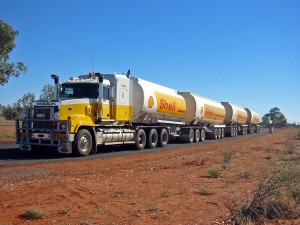It’s Time for Trains
 I think one of the most awe-inspiring automotive sights possible is seeing an Outback road-train pulling into a truck stop at night.
I think one of the most awe-inspiring automotive sights possible is seeing an Outback road-train pulling into a truck stop at night.
Hot, dark air pushed aside by the behemoth, a vehicle that has been driving for hundreds of kilometres into a tunnel of light lit by the huge spotlights, brushing away – depending on the location – ‘roos, rabbits or even bulls.
It’s enough to raise the hairs on your neck, the glorious romance of pushing a load through the immensity of darkness.
Over the years I have listened to many truck drivers talking on the CB, in the distant past on 27 megs and more recently, on UHF. Over that time I have become a fan; being able to talk to these guys, sometimes from a very small car, has given me confidence and understanding and empathy with these drivers of giants.
I love big trucks and enormously admire those who drive them.
But when you start talking interstate hauls, most of their loads should be on trains.
Yep, trains.
It doesn’t matter if you look from the perspectives of road safety, of road maintenance, of greenhouse gas emissions or of total fuel usage.
For long distance, trains do it better.
This article says it better than I can.
I love trucks, but for long distance freight, it’s time for trains.

 Julian Edgar, 50, has been writing about car modification and automotive technology for nearly 25 years. He has owned cars with two, three, four, five, six and eight cylinders; single turbo, twin turbo, supercharged, diesel and hybrid electric drivelines. He lists his transport interests as turbocharging, aerodynamics, suspension design and human-powered vehicles.
Julian Edgar, 50, has been writing about car modification and automotive technology for nearly 25 years. He has owned cars with two, three, four, five, six and eight cylinders; single turbo, twin turbo, supercharged, diesel and hybrid electric drivelines. He lists his transport interests as turbocharging, aerodynamics, suspension design and human-powered vehicles.

on July 31st, 2008 at 9:44 am
I couldn’t agree more. The rail network needs to be maintained and presented as a better alternative to trucks.
Here in Tasmania we are on the brink of loosing our train network which will ultimately result in more and more trucks on our roads.
on July 31st, 2008 at 10:00 am
I guess the problem then becomes how do you get the freight to/from the trains? It would be prohibitively expensive to have trainlines running to every single town and minesite, particularly over here in Western Australia.
on July 31st, 2008 at 10:57 am
Not the old train versus truck again…
The linked article is riddled with comments that oversimplify why in Australia rail is a better solution. It isn’t. Unlike the UK/Europe we don’t have massive networks of laid track everywhere for starters.(Noticed the linked article content is based on a UK study)
I posted to Trucking LIfe magazine a clip cut from the Adelaide Advertiser in what the head of the rail authority said many years ago on the benefits of rail over trucks. It was absolutely laughable. The subsequent write up in TL was terse and described how the underperforming aswell oversubsidised rail system was conning the Australian public basically.
What’s real funny is the new Adelaide to Darwin railway line is going to be bought out by trucking magnate Allan Scott from Mt Gambier. For instance, when the A to D line started, Northline transport went with rail originally then after 6 months went back to road and are still with road.
Nearly five years ago, I purchased a book for a truck driving relative. The whole book was only about all the ‘official’ road transport enquiries, investigations and commissions held since federation by governments in Australia. Boring yet the tally was nearly hundred. So many concerned rail vs road transport. No answer till this day and yet we have another ogre called climate change to deal with now.(Sceptic)
Anyway, what rail save’s in fuel/gas emissions via point to point rail hubs is lost with railyard fowarding from there on.
on July 31st, 2008 at 4:28 pm
A proper costing of Rail vs Truck is very difficult BUT should include the costs of road accidents inolving trucks (hospital, medical, rehab, lost days of work) and the cost of accelerated deterioration of the road surface caused directly by trucks.
Added to the fuel and carbon debate these two significant costs help sway me to the pro rail side and that is before counting the psychological cost to my own family with two members killed in a head on highway crash with a semi and several non fatal but serious crashes among our friends involving trucks.
On several recent interstate road trips I saw plenty rouge truck drivers with no concept of the ” duty of care” and wolud personally pay higer costs of goods if need be to reduce the number of trucks on the highways and byways.
on July 31st, 2008 at 9:02 pm
Just to add to the debate, coastal shipping is ignored in Australia.
When I was Distribution Manager of Ford Australia, I used the “Traders” quite a lot from Melbourne to Townsville , Rocky and Brisbane.
It was preferable to rail because of the damage and theft that we suffered mainly in NSW, although I visited Clapham Junction in Brissy once to find all the workers’ cars adorned with Ford driving lights and other gear .
The problem with rail is the culture of “stuff it and stuff you” that State Governments have let happen and grow over 100 years.
NSW is now reaping the benefit.
Regards Philip A
on August 1st, 2008 at 1:34 pm
Yes, but rail is by its very nature monopolistic. Whilst the operating costs are much, much lower for rail, the reality of the market place means that costs are comparable if not higher. We rail coal and ore to our site, and yet we can do it cheaper by truck.
The real solution is not rail vs road, its (where an ocean exists) sea freight. Its more efficient than road or rail and the numbers of ships and consequent competition (present climate perhaps excepted) mean that it’s very cheap. We can send bulk cargo to China for what it costs us to road or rail 600km (and this is with shipping rates that have gone up at least 50% in the last year).